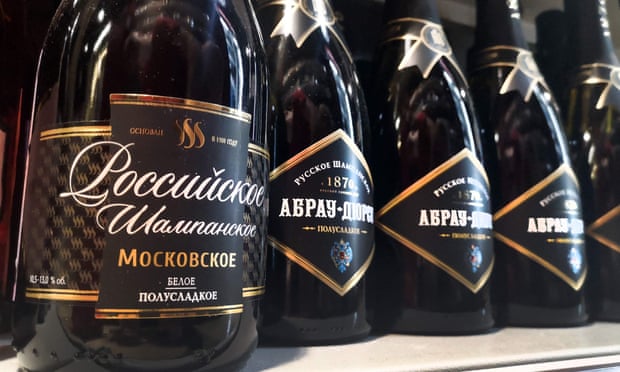If anything is guaranteed to get French wine producers in a fizz, it is the suggestion that champagne can be made anywhere outside the Champagne region in France.
As a protected appellation, the term is jealously guarded and legally defended. As the Champagne committee’s website clearly states: “Champagne only comes from Champagne.”
But in a provocative move on Friday, Vladimir Putin signed legislation requiring all non-Russian producers to mark their products in Russia as “sparkling wine” on the back of every bottle, including some of the world’s most famous and expensive bubbly.
Under the law, only locally made Shampanskoye is worthy of the prestigious and previously exclusive name, and French appellations are not recognised.
On Saturday the celebrated champagne producer Moët Hennessy, part of the LVMH luxury group that includes Veuve Clicquot, Ruinart, Mercier, Krug and Dom Pérignon, threatened to suspend exports to Russia.
Leonid Rafailov, the director general of AST, one of Russia’s main wine distributors, acknowledged Moët’s move, telling AFP: “I can confirm I have received notification of this, and it’s justified.”
But by Monday the threat had gone flat when the company announced it would resume deliveries. “The Moët Hennessy champagne houses have always respected the law in place wherever they operate and will restart deliveries as soon as it is able to make the [label] changes,” the group said.
France has 16,200 champagne wine growers and 360 champagne houses, producing around 231m bottles a year. Champagne is made from only three grapes: pinot noir, meunier and chardonnay. The market is worth €4.2m, of which €2.6m is exports, with the UK and US the biggest customers.
Russia imports almost 50m litres of sparkling wine every year. French champagne represents 13% of this market and Moët Hennessy only 2% of this.
Russian Shampanskoye is the post-USSR reincarnation of what was called Soviet champagne, a popular cheap sparkling drink created in the Stalin era in the 1930s to make a version of the elite wine that was available to all.
Le Monde suggested Putin’s move was a nod to his close friend and associate Yuri Kovalchuk, the billionaire who owns the Novy Svet and Massandra wineries in Crimea, annexed by Moscow from Ukraine in 2014.
“For correctness, we just need to rename Kuban [a Russian wine-producing region] as champagne and it will all be rather logical,” joked Vasily Oblomov, a Russian musician. He also suggested a law requiring that “Mercedes” be defined as cars only made in Russia.
The French champagne producers’ committee said the region was “scandalised” by the Russian legislation and called on French and European officials to demand that “this unacceptable law be modified”. It also called for the suspension of champagne exports to Russia.
“Depriving the people of Champagne the right to use their name is scandalous. It’s our common heritage and the apple of our eye,” said Maxime Toubart and Jean-Marie Barillère, co-presidents of the Comité Champagne. “The Champagne name is protected in more than 120 countries.”






